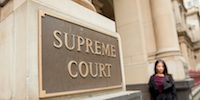LAWSUITS NEWS & LEGAL INFORMATION
Risperdal Lawsuits
Read our Risperdal FAQ
Were you looking for Risk for Intraoperative Floppy Iris Syndrome with Risperdal and Invega lawsuits?
By Jane Mundy
Risperdal (generic name Risperidone) is an atypical antipsychotic that works by changing the activity of certain natural substances in the brain. Developed by Janssen Pharmaceuticals, a subsidiary of Johnson & Johnson, Risperdal was approved by the FDA in 1993 for the treatment of schizophrenia in adults. Risperdal Lawsuits have shown a link between Risperdal and growing male breasts, known as Risperdal gynecomastia. Other Risperdal side effects include tardive dyskinesia, high blood sugar and diabetes, stroke, heart attack and even death.
Risperdal is also approved for bipolar disorder and the first drug approved by the FDA to treat behavioral problems in people with autism-related irritability. It was approved in 2006 to treat such irritability in children as young as five years of age. Risperdal is prescribed orally in pill form and Risperdal Consta is administered by injection for patients suffering from Bipolar I disorder who require longer-term medication treatment.
In 2006 a clinical study at Duke University showed a link with Risperdal and gynecomastia and that premature breast development may also occur in girls. Despite this evidence, the FDA approved Risperdal for the treatment of schizophrenia in children and bipolar disorder in both children and adults in 2007. The agency ordered a black box warning on its label in 2005 to warn of increased risk of death in elderly patients with dementia-related psychosis.
 Attorneys for Risperdal victims claim that J&J and Janssen used illegal marketing to promote Risperdal for unapproved uses even after they were aware of the link to gynecomastia, and it failed to adequately warn of those risks.
Attorneys for Risperdal victims claim that J&J and Janssen used illegal marketing to promote Risperdal for unapproved uses even after they were aware of the link to gynecomastia, and it failed to adequately warn of those risks.
In 2001 Janssen funded a study that showed 3.8 percent of boys given Risperdal during their clinical trial developed breasts that were either “probably or very likely” caused by the drug. Also in 2001, the Miami Herald reported cases of Risperdal gynecomastia development in boys while in the Florida foster care system who had been given the drug as a pharmaceutical “restraint”.
Between 1999 and 2008, serious adverse event reports of Risperdal use in children numbered over 1200, including 31 deaths. In 2008, the Wall Street Journal reported that Risperdal had been shown to increase prolactin levels (leading to breast development and lactation) and experts reported up to 70 percent of gynecomastia childhood events were found to be caused by Risperdal use. Also in 2008, the FDA concluded that warnings did not need to be strengthened on Risperdal labeling.
Bloomberg News in 2012 reported that more than 100 lawsuits were related to gynecomastia and six gynecomastia suits were settled for undisclosed amounts before the FDA Commissioner could be called as a witness.
 Risperdal “Off-Label” Lawsuits
Risperdal lawsuits also allege that the drug company encouraged off-label prescriptions for children before the breast growth side effect warning was added to the label. According to court documents, J&J encouraged doctors to prescribe Risperdal off-label to treat attention deficit and disruptive behavior and other childhood disorders. Although doctors are allowed to prescribe medicine as they see fit, drug companies can market their products only for uses approved by the FDA. As well, research indicates that off- label use of Risperdal to treat ADHD is increasing.
Risperdal “Off-Label” Lawsuits
Risperdal lawsuits also allege that the drug company encouraged off-label prescriptions for children before the breast growth side effect warning was added to the label. According to court documents, J&J encouraged doctors to prescribe Risperdal off-label to treat attention deficit and disruptive behavior and other childhood disorders. Although doctors are allowed to prescribe medicine as they see fit, drug companies can market their products only for uses approved by the FDA. As well, research indicates that off- label use of Risperdal to treat ADHD is increasing.
Risperdal Gynecomastia Lawsuits As of June 2016, about 1,750 Risperdal Gynecomastia lawsuits filed against Janssen Pharmaceuticals are pending in Philadelphia and thousands more Risperdal gynecomastia cases are pending nationwide. Of four Risperdal cases tried to verdict three have resulted in favor of the injured plaintiff. A fifth case ended with some jurors saying there was not enough evidence to directly link Risperdal as the cause of gynecomastia, although they unanimously agreed that J&J should have warned the public that its drug could lead to excessive breast growth.
July 2016: A jury in the Philadelphia Court of Common Pleas with Judge Paula Patrick presiding awarded $70 million to the family of a Tennessee boy who alleged he developed gynecomastia after taking Rispderal. ( A.Y. v. Janssen Pharm., Inc., Pa. Ct. Com. Pl., No. 130402094, verdict 7/1/16 ). This verdict is the fifth in which a jury found that Johnson & Johnson and subsidiary Janssen Pharmaceuticals Inc. failed to warn about Risperdal's risks.
December 2015: Timothy Stange from Wisconsin was awarded $500,000 after a jury found that Janssen Pharmaceuticals failed to warn about Risperdal’s link to excess growth of breast tissue and that its negligence caused his injuries. Stange took Risperdal as a teenager from 2006-2009. It was the fourth case to go to trial in Philadelphia and the third to end in favor of the plaintiffs.
November 2015: Nicolas Murray was awarded $1.75 million for damages from disfigurement and mental anguish, even though he continued to take Risperdal after a warning was added to the label in 2006. Murray was prescribed the anti-psychotic drug when he was nine years old. His attorney argued that J&J knew as early as 2001 that Risperdal caused boys to grow breasts.
March 2015: This second verdict found in favor of the defense, Janssen Pharmaceuticals, rather than plaintiff William Cirba. Although the jury determined that J&J failed to warn of gynecomastia risks, no damages were awarded because a direct link between Risperdal and Cirba’s breast growth was not established.
February 2015: The first Risperdal trial awarded plaintiff Austin Pledger and his family $2.5 million. Pledger took the drug when he was eight years old to treat symptoms of autism, which was prescribed “off-label”. In his teenage years, Pledger developed size 46 DD breasts. Dr. David Kessler, a pediatrician and former commissioner of the FDA, testified that J&J failed to warn about gynecomastia. Pledger’s doctor said he would have reconsidered prescribing Risperdal had he known of the risks.
September 2012: On the first day of trial, J&J settled a lawsuit filed on behalf of Aaron Banks, who developed breasts after taking Risperdal when he was nine years old. He continued taking the drug until age 14 and required surgery to remove the breast tissue.
Since 1999 Risperdal has been linked to diabetes. Researchers found that about 50 percent of patients taking Risperdal in a study comparing its risk to Eli Lilly & Co.'s Zyprexa antipsychotic drug, developed diabetes after a year on the medication. Diabetes can lead to other serious health risks including stroke, heart attack and other cardiovascular diseases.
Janssen in 2002 issued a letter to Canadian practitioners warning of risks in the elderly dementia population but did not warn US practitioners until the following year. Risperdal is responsible for at least 37 cases of stroke type events including 16 deaths.
Risperdal has not been approved for the treatment of dementia in the elderly. The FDA determined that the elderly who suffer from dementia and have used Risperdal were 1.6 to 1.7 times more likely to die of various ailments, including heart disease. Its website now warns that elderly patients are at an increased risk of cardiovascular death with increased use of Risperdal Consta long-acting injection. In November 2013, Johnson & Johnson agreed to pay $2.2 billion in civil and criminal fines to settle claims it improperly marketed Risperdal, including to the elderly with dementia.
Risperdal PTSD Study A study conducted by the Department of Veterans Affairs and published in the Journal of the American Medical Association suggests that Risperdal may be no more effective than a placebo at treating veteran PTSD. Researchers found that five percent of veterans with PTSD who were given Risperdal and five percent who were given a placebo reported a fully recovery. Meanwhile, between 10 percent and 20 percent of both groups reported some improvement of their condition. The group that was given Risperdal, however, was reportedly more likely to suffer side effects including weight gain.
Risperdal and Invega Floppy Iris Syndrome Alert Health Canada in conjunction with Janssen Inc. issued new safety information in November, 2013, regarding the risk of Intraoperative Floppy Iris Syndrome (IFIS) associated with the use of RISPERDAL®, RISPERDAL® M-TAB®, RISPERDAL® CONSTA® (risperidone), INVEGA® (paliperidone) and INVEGA SUSTENNA® (paliperidone palmitate). The risk of IFIS is associated with the use of risperidone- or paliperidone-containing products, which are primarily prescribed for the treatment of schizophrenia--however, the risk applies to all patients undergoing cataract surgery, who have been exposed to these products, irrespective of indication. IFIS is characterized by a triad of intraoperative signs (billowing of a flaccid iris stroma, progressive intraoperative pupil constriction and a propensity for iris prolapse) that may present with varying degrees of severity and is associated with an increased rate of cataract surgical complications.
Risperdal Consta, which is injected, is stored and given to patients at clinics. In September 2013 Risperdal Consta was recalled after discovering mold during routine quality testing. According to J&J and the FDA, the 25 mg liquid dose of Risperdal Consta was recalled from lot No. 309316 and outsourced to another company, Alkermes Inc. It was shipped from Jan. 14 to May 20, 2013. Risperdal Consta is one of J &J's top-selling drugs, with $1.4 billion in sales last year.
January 2010: Whistleblowers, state attorneys general, and the Department of Justice filed a Risperdal lawsuit against Johnson & Johnson claiming the drug company paid $50 million in kickbacks to Omnicare, a pharmaceutical supply company, for bogus services. Omnicare used the money to market Risperdal to doctors, urging them to prescribe the drug to nursing home residents. J&J settled with the government for $112 million.
August 2011: Massachusetts and several other states filed suit against J&J alleging it promoted Risperdal for off-label treatments and failed to disclose serious Risperdal side effects including diabetes and an increased risk of death in elderly patients.
January 2012: Bloomberg reported that J&J settled a Risperdal fraud lawsuit brought by Texas on behalf of its Medicaid program for $158 million.
August 2012: J&J entered a guilty plea for a misdemeanor after U.S. Securities and Exchange Commission filings indicated that the government had investigated the company' sales practices.
Johnson & Johnson In 2013 J&J paid $2.2 billion in fines and penalties to the US Department of Justice to avoid prosecution related to misbranding of Risperdal, which is the largest settlement of its type. Before its patent expired in 2007, Risperdal generated upward of $25 billion for the giant drug company. Today the Risperdal franchise, including a related medication Invega, generates combined sales of over $3 billion per year for J&J, which has a yearly income worldwide of about $71 billion.
Last updated on
En Español RISPERDAL
FREE RISPERDAL LAWSUIT EVALUATION
Send your Risperdal claim to a lawyer who will review your claim at NO COST or obligation.
GET LEGAL HELP NOW
GET LEGAL HELP NOW
Risperdal FDA Approval and Black Box Warning
In 2006 a clinical study at Duke University showed a link with Risperdal and gynecomastia and that premature breast development may also occur in girls. Despite this evidence, the FDA approved Risperdal for the treatment of schizophrenia in children and bipolar disorder in both children and adults in 2007. The agency ordered a black box warning on its label in 2005 to warn of increased risk of death in elderly patients with dementia-related psychosis.
Risperdal Gynecomastia (Breast Development in Males)
 Attorneys for Risperdal victims claim that J&J and Janssen used illegal marketing to promote Risperdal for unapproved uses even after they were aware of the link to gynecomastia, and it failed to adequately warn of those risks.
Attorneys for Risperdal victims claim that J&J and Janssen used illegal marketing to promote Risperdal for unapproved uses even after they were aware of the link to gynecomastia, and it failed to adequately warn of those risks.In 2001 Janssen funded a study that showed 3.8 percent of boys given Risperdal during their clinical trial developed breasts that were either “probably or very likely” caused by the drug. Also in 2001, the Miami Herald reported cases of Risperdal gynecomastia development in boys while in the Florida foster care system who had been given the drug as a pharmaceutical “restraint”.
Between 1999 and 2008, serious adverse event reports of Risperdal use in children numbered over 1200, including 31 deaths. In 2008, the Wall Street Journal reported that Risperdal had been shown to increase prolactin levels (leading to breast development and lactation) and experts reported up to 70 percent of gynecomastia childhood events were found to be caused by Risperdal use. Also in 2008, the FDA concluded that warnings did not need to be strengthened on Risperdal labeling.
Bloomberg News in 2012 reported that more than 100 lawsuits were related to gynecomastia and six gynecomastia suits were settled for undisclosed amounts before the FDA Commissioner could be called as a witness.
Risperdal Gynecomastia Lawsuits
 Risperdal “Off-Label” Lawsuits
Risperdal lawsuits also allege that the drug company encouraged off-label prescriptions for children before the breast growth side effect warning was added to the label. According to court documents, J&J encouraged doctors to prescribe Risperdal off-label to treat attention deficit and disruptive behavior and other childhood disorders. Although doctors are allowed to prescribe medicine as they see fit, drug companies can market their products only for uses approved by the FDA. As well, research indicates that off- label use of Risperdal to treat ADHD is increasing.
Risperdal “Off-Label” Lawsuits
Risperdal lawsuits also allege that the drug company encouraged off-label prescriptions for children before the breast growth side effect warning was added to the label. According to court documents, J&J encouraged doctors to prescribe Risperdal off-label to treat attention deficit and disruptive behavior and other childhood disorders. Although doctors are allowed to prescribe medicine as they see fit, drug companies can market their products only for uses approved by the FDA. As well, research indicates that off- label use of Risperdal to treat ADHD is increasing.Risperdal Gynecomastia Lawsuits As of June 2016, about 1,750 Risperdal Gynecomastia lawsuits filed against Janssen Pharmaceuticals are pending in Philadelphia and thousands more Risperdal gynecomastia cases are pending nationwide. Of four Risperdal cases tried to verdict three have resulted in favor of the injured plaintiff. A fifth case ended with some jurors saying there was not enough evidence to directly link Risperdal as the cause of gynecomastia, although they unanimously agreed that J&J should have warned the public that its drug could lead to excessive breast growth.
July 2016: A jury in the Philadelphia Court of Common Pleas with Judge Paula Patrick presiding awarded $70 million to the family of a Tennessee boy who alleged he developed gynecomastia after taking Rispderal. ( A.Y. v. Janssen Pharm., Inc., Pa. Ct. Com. Pl., No. 130402094, verdict 7/1/16 ). This verdict is the fifth in which a jury found that Johnson & Johnson and subsidiary Janssen Pharmaceuticals Inc. failed to warn about Risperdal's risks.
December 2015: Timothy Stange from Wisconsin was awarded $500,000 after a jury found that Janssen Pharmaceuticals failed to warn about Risperdal’s link to excess growth of breast tissue and that its negligence caused his injuries. Stange took Risperdal as a teenager from 2006-2009. It was the fourth case to go to trial in Philadelphia and the third to end in favor of the plaintiffs.
November 2015: Nicolas Murray was awarded $1.75 million for damages from disfigurement and mental anguish, even though he continued to take Risperdal after a warning was added to the label in 2006. Murray was prescribed the anti-psychotic drug when he was nine years old. His attorney argued that J&J knew as early as 2001 that Risperdal caused boys to grow breasts.
March 2015: This second verdict found in favor of the defense, Janssen Pharmaceuticals, rather than plaintiff William Cirba. Although the jury determined that J&J failed to warn of gynecomastia risks, no damages were awarded because a direct link between Risperdal and Cirba’s breast growth was not established.
February 2015: The first Risperdal trial awarded plaintiff Austin Pledger and his family $2.5 million. Pledger took the drug when he was eight years old to treat symptoms of autism, which was prescribed “off-label”. In his teenage years, Pledger developed size 46 DD breasts. Dr. David Kessler, a pediatrician and former commissioner of the FDA, testified that J&J failed to warn about gynecomastia. Pledger’s doctor said he would have reconsidered prescribing Risperdal had he known of the risks.
September 2012: On the first day of trial, J&J settled a lawsuit filed on behalf of Aaron Banks, who developed breasts after taking Risperdal when he was nine years old. He continued taking the drug until age 14 and required surgery to remove the breast tissue.
Risperdal Diabetes, Risperdal Dementia and Risperdal Heart Disease
Janssen in 2002 issued a letter to Canadian practitioners warning of risks in the elderly dementia population but did not warn US practitioners until the following year. Risperdal is responsible for at least 37 cases of stroke type events including 16 deaths.
Risperdal has not been approved for the treatment of dementia in the elderly. The FDA determined that the elderly who suffer from dementia and have used Risperdal were 1.6 to 1.7 times more likely to die of various ailments, including heart disease. Its website now warns that elderly patients are at an increased risk of cardiovascular death with increased use of Risperdal Consta long-acting injection. In November 2013, Johnson & Johnson agreed to pay $2.2 billion in civil and criminal fines to settle claims it improperly marketed Risperdal, including to the elderly with dementia.
Other Risperdal Side Effects
Risperdal and Invega Floppy Iris Syndrome Alert Health Canada in conjunction with Janssen Inc. issued new safety information in November, 2013, regarding the risk of Intraoperative Floppy Iris Syndrome (IFIS) associated with the use of RISPERDAL®, RISPERDAL® M-TAB®, RISPERDAL® CONSTA® (risperidone), INVEGA® (paliperidone) and INVEGA SUSTENNA® (paliperidone palmitate). The risk of IFIS is associated with the use of risperidone- or paliperidone-containing products, which are primarily prescribed for the treatment of schizophrenia--however, the risk applies to all patients undergoing cataract surgery, who have been exposed to these products, irrespective of indication. IFIS is characterized by a triad of intraoperative signs (billowing of a flaccid iris stroma, progressive intraoperative pupil constriction and a propensity for iris prolapse) that may present with varying degrees of severity and is associated with an increased rate of cataract surgical complications.
Risperdal Consta Recall
Other Risperdal Lawsuits
August 2011: Massachusetts and several other states filed suit against J&J alleging it promoted Risperdal for off-label treatments and failed to disclose serious Risperdal side effects including diabetes and an increased risk of death in elderly patients.
January 2012: Bloomberg reported that J&J settled a Risperdal fraud lawsuit brought by Texas on behalf of its Medicaid program for $158 million.
August 2012: J&J entered a guilty plea for a misdemeanor after U.S. Securities and Exchange Commission filings indicated that the government had investigated the company' sales practices.
Johnson & Johnson In 2013 J&J paid $2.2 billion in fines and penalties to the US Department of Justice to avoid prosecution related to misbranding of Risperdal, which is the largest settlement of its type. Before its patent expired in 2007, Risperdal generated upward of $25 billion for the giant drug company. Today the Risperdal franchise, including a related medication Invega, generates combined sales of over $3 billion per year for J&J, which has a yearly income worldwide of about $71 billion.
Risperdal Legal Help
If you or a loved one has suffered a stroke while taking Risperdal, please click the link below to send your complaint to a Risperdal lawyer for a free case evaluation.Last updated on
RISPERDAL LEGAL ARTICLES AND INTERVIEWS
Has J&J Lost Its Way?

Will Pennsylvania Supreme Court Hear Risperdal Time Bar Appeal?

Risperdal Patient "Never asked for Gynecomastia or Weight Gain"


October 25, 2019
One of thousands of Risperdal cases pending in the Philadelphia court system has resulted in a whopping $8 billion in damages awarded to a single plaintiff who claimed he developed breasts, a condition known as gynecomastia. Plaintiff Nicholas Murray’s lawyers told the jury following the verdict that, “Johnson and Johnson is a company which has lost its way.” READ MORE
Will Pennsylvania Supreme Court Hear Risperdal Time Bar Appeal?

March 12, 2018
Philadelphia, PA: All eyes are on the Pennsylvania Supreme Court, as justices with the highest hall of justice in the State debate whether, or not to hear an appeal of a lower court ruling that could put an undetermined number of Risperdal gynecomastia lawsuits currently housed in a mass tort, in jeopardy. READ MORE
Risperdal Patient "Never asked for Gynecomastia or Weight Gain"

February 9, 2018
Albuquerque NM:When Daniel was 17 years old, life was good. He was the star of his high school baseball team, he was in top form. But within a few years his life went sideways and Daniel wound up in the psych ward, "forced" to take Risperdal. READ MORE
READ MORE Drugs/Medical Settlements and Legal News
READ MORE Personal Injury Settlements and Legal News
READ MORE Personal Injury Settlements and Legal News

READER COMMENTS
Christopher Walton
on
Barricks Brandy
on
Bryan K Thomason
on
Nelson Teixeira
on
Kim Ringwald
on
Patricia Antoine
on
Robin
on
will w. in Tennessee
on
the drug companies only care about profit. and nothing else.
Dennis Johnston
on
Errol malone
on
PJ
on
delirium. Seven mos. later the vet died. Yes it causes death.
Eric Abrahamson
on
Finally I got to a diabetes educator, neurologist, and endocrinologist, learned how to control my diabetes, and since then I've stopped the complications and the doctor says I've reversed the whole thing. Except this robber beat me up, tore off the whole toenail on my left big toe, it got a hallux limitus, ingrown, infected, and became a diabetic ulcer, with a partial matrixectomy by a podiatric surgeon, which is the first step to amputation, if you're not extremely careful. They think you're doomed and cursed, but they don't understand the exact medical process--1/2 of amputees die in 5 years. Most diabetics die of heart attacks, but I take 5 heart meds, exercise a lot, control my blood sugar with diet, and the cardiologist says, "Your numbers are fantastic," so it's unlikely. I was still trying to get a computer science degree and living with Laurie when all this happened, and I'm up for suing Johnson & Johnson for not releasing the studies linking Risperdal to diabetes. If I die it would be nice if Laurie and her new husband got something for the wrongful death. I went to Yale, and I remind myself of the victims in the tragedies my drama school roommate does.
Brandy Gunter
on
New York
on
Tennessee
on
Arkansas
on
Kansas
on
Pennsylvania
on
Ontario
on
Georgia
on
Georgia
on